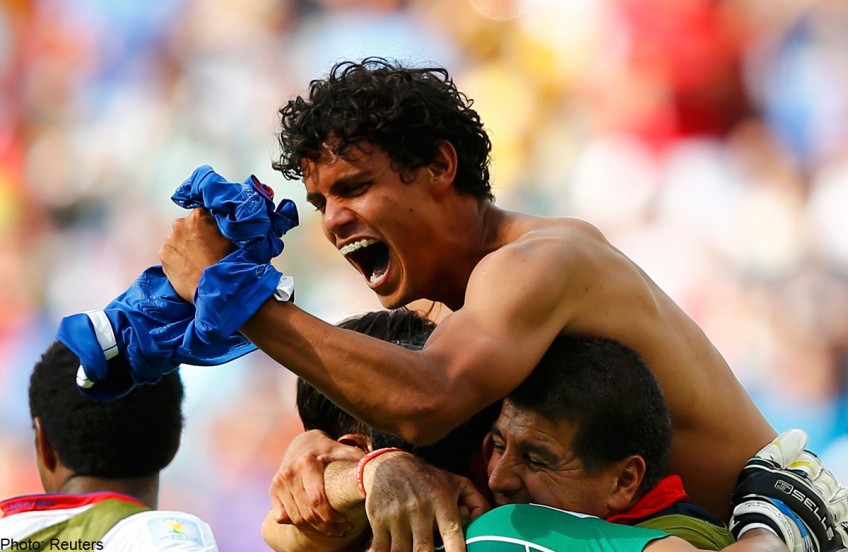Real climate for change in Brazil


So the world's top team are out of the World Cup. So too the country that claims to have the world's best football league. And soon, they may be joined by the world's best player.
Unless Cristiano Ronaldo manages a miracle in Brasilia for Portugal's final group match against Ghana on Thursday, while hoping that the Germany-United States match does not end in a draw, he and his Portugal team will join Spain and England on the early flights home from Brazil.
In their place? The likes of Costa Rica and Colombia - who are making their first appearance in the knockout stage since 1990 - along with Chile.
So much drama and it is just the group stage. Just what is happening at World Cup 2014?
Well, the readily available excuse here for the surprising results is the hot and humid weather. The conditions, especially in northern Brazil where the mercury level can hover above 30 deg C and the humidity around 70 per cent, have taken a little getting used to.
Many players and coaches have complained about the less-than-ideal conditions. They say that the Latin American teams are doing well because they are used to the climate.
While there is no denying that Brazil's weather has affected teams - players tire faster and also take longer to recover - perhaps too much credit is being given to Mother Nature being the main reason for the strong performance of Latin American sides.
For one, the majority of the players from the Costa Rica, Colombia and Chile squads playtheir club football in Europe. So while they may be familiar with the conditions, they too need to acclimatise.
Perhaps the real reason is a footballing one.
With more players exposed to European football and more coaches aided by technology and schooled in modern tactics and the way of the stronger teams, the gap between top sides and those deemed cannon fodder has narrowed.
Each of the 32 teams has at least one player who plies his trade in a top European league, where the standard of football is widely regarded as the best.
It is a theory that Brazil coach Luiz Felipe Scolari backs.
"There are no longer easy teams at the World Cup. It's a much more level playing field," the former Chelsea manager said. "And it's not just me who is saying that, everyone's saying that.
"The game has changed. Both tactically and in terms of (quality of) players, football is more level."
He highlighted matches such as Argentina-Iran - where Iran's stubborn defence kept the two-time World Cup winners at bay for 90 minutes, before conceding the game's only goal in stoppage time - as a good example.
"One player made the difference," he said of Lionel Messi's wonder goal.
He also added that football systems have remained largely the same over the last 10 to 15 years, with only slight variations. The common one used today, although some teams tweak it a little, is the 4-4-1-1 line-up.
"Football is well organised now. And when teams have nine defenders and one striker, the space is reduced greatly."
This probably explains why in Brazil 2014, there has been no repeat of the 6-0 (Argentina over Serbia in 2006), 7-0 (Portugal over North Korea in 2010)scorelines of previous tournaments. In fact, in Brazil, the more lop-sided results have been between top European sides - 5-1 in the Netherlands-Spain game and 4-0 in the Germany-Portugal encounter.
The narrowing of the gap is also due to the increase in coaching expertise. Iran, for example, have former Manchester United assistant coach and defensive mastermind Carlos Queiroz at the helm.
Costa Rica coach Jorge Luis Pinto is a Jose Mourinho admirer and a keen student of the game. He has his own website where he discusses tactics and aspects of the game at length with the aid of videos. He travelled to the last five World Cups to analyse tactics and playing styles.
Another reason behind the dramatic fall of top sides is that the game has evolved, placing more emphasis on physical attributes, strength, fitness and speed.
Spain's Xabi Alonso admitted that the defending champions were "struggling" physically in Brazil. Spain, with an average age of 28.2 years, have one of the oldest squads in the tournament. Portugal, with the lumbering Bruno Alves, 32, also have an average age of 28.2.
Given the high physical demands of the modern game, it is not surprising to see that squads which function better as a unit reap the rewards.
For example, England, despite all their stars, have often looked a disjointed team of individuals in Brazil. Yet Costa Rica, whose key players struggled at the club level - Bryan Ruiz, the match winner against Italy, could not get a game with relegated English Premier League side Fulham - shone as one unit.
You may have a Messi, a Ronaldo, a Neymar, but ultimately football is a team sport. And the reason why the big guns have flopped is that they simply failed to function as a team while other, fast-improving, lesser lights have.
marclim@sph.com.sg

This article was first published on June 24, 2014.
Get a copy of The Straits Times or go to straitstimes.com for more stories.
[[nid:110969]]